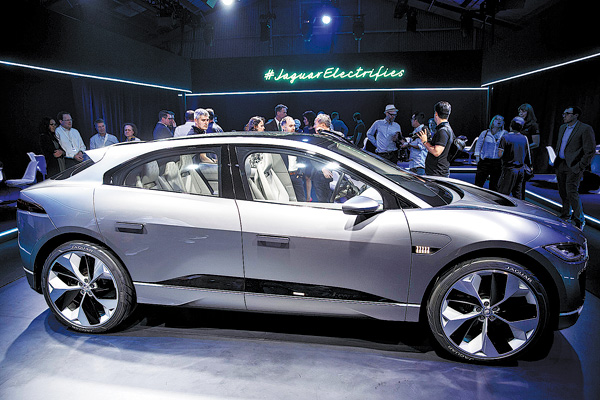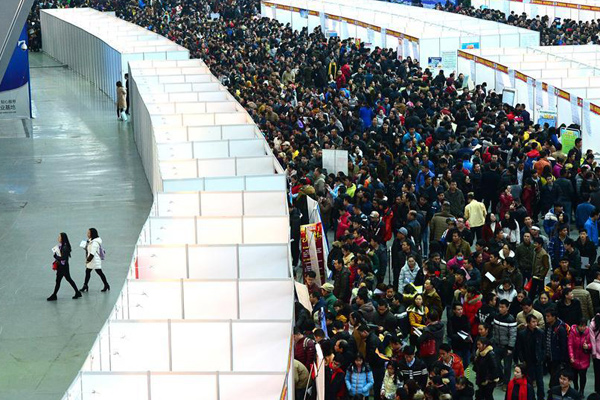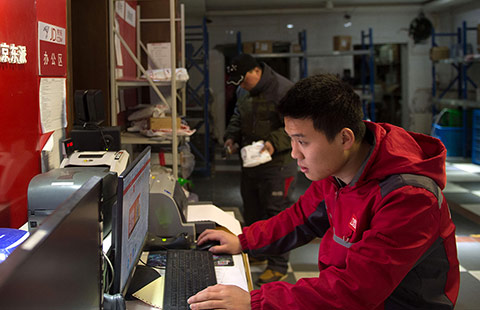Import tax would hurt Jaguar Land Rover, help rivals
 |
|
Attendees view the Jaguar Land Rover Automotive PLC I-Pace Electric Concept luxury SUV during an event in Los Angeles, California. [Photo provided to China Daily] |
As Washington mulls a tax on imports, an auto industry study suggests the policy would deliver the sharpest blow to Tata Motors' Jaguar Land Rover while giving a leg up to Tesla and Ford Motor.
In what it calls a "thought exercise," researcher Baum & Associates LLC estimates most automakers would need to raise vehicle prices by thousands of dollars-more than $17,000 per vehicle in the case of Jaguar Land Rover, which imports all its vehicles-to recoup higher costs incurred by a proposed border-adjusted tax.
Ford, with significant domestic manufacturing, would need to mull the smallest price hike among major automakers, at about $282 per vehicle, followed by General Motors at $995, according to the report.
The estimates aim to show the relative impact of the tax plan on each automaker, according to Alan Baum, the founder of West Bloomfield, Michigan-based Baum& Associates.
Carmakers are unlikely to raise prices by more than a few thousand dollars per car and would also likely have to foot some of the higher tax burden.
"The plan results in a net cost for automakers," Baum said. "Each company will then make its own decisions on pricing in order to best compete and maximize its profits."
Volvo and VW vehicle prices would have to rise by about $7,600 and $6,800 on average, according to estimates by Baum & Associates, which advises suppliers.
President of the United States Donald Trump is said to be warming to the border-adjusted tax after initially viewing it as too complicated. The proposal to begin levying companies' imports and domestic sales and make exports tax-exempt would completely overhaul the US tax code. General Electric and Boeing are among the US manufacturers that are getting behind the idea, while Toyota Motor and Wal-Mart are among the corporate giants warning it will result in costlier products, ranging from food and clothing to gasoline and auto parts.
The Baum & Associates report accounts for imports of both finished vehicles and parts for domestic cars that are made overseas.
The one automaker that may be able to keep prices steady would be Model S sedan maker Tesla.
The proposed border tax might induce automakers to boost US parts procurement-and from existing vehicle assembly plants, according to the report.
Overseas automakers including Fuji Heavy Industries' Subaru, Mitsubishi Motors, Mazda Motor and Hyundai Motor and Kia Motors might also consider expanding their existing US operations or building new capacity.
Pure importers
"Pure importers" such as Jaguar Land Rover, Volvo parent company Geely Automobile Holdings, Mazda and Mitsubishi are most "in the crosshairs" of a border-tax regime due to their total reliance on imports for their sales in the US, the report said.
If the tax is put in place and the companies want to remain competitive, Jaguar Land Rover and Volvo "will need to ramp up US parts sourcing and/or build plants here," the report added.
"The border tax approach will otherwise consume all of their profits from selling vehicles here," it continued.
Volvo is already moving in that direction, with plans to assemble S60 sedans at a new factory in South Carolina starting in late 2018.
GM, Fiat Chrysler, Honda, Ford and Tesla each source more than 60 percent of their US vehicle sales domestically, according to the report, with Ford at 82 percent and Tesla exclusively assembling vehicles in California.
Hurting neighbors
If auto sales slow, the tax would create an incentive for automakers to keep US plants running at the expense of those in Canada and Mexico.
That could encourage Fiat Chrysler Automobiles NV to accelerate the conversion of factories in Michigan to build pickups there instead of Mexico, said Dan Luria, an economist at the Michigan Manufacturing Technology Center in Ann Arbor and the lead author of the Baum & Associates report.
Nissan Motor might export more from Mexico to Latin American markets and less to the US, and Volkswagen AG could build another US assembly plant.
Mazda and Mitsubishi, which rely entirely on imports to the US market, may have to quit the US market or pay other manufacturers to assemble their cars, Luria said.
In its current form, the proposed border tax could lead to the production of up to 1 million additional vehicles in the US and 50,000 more jobs at car and part assembly plants, Luria said.
In a separate report released on Wednesday, Colin Langan, an analyst at UBS Securities LLC, said the proposed border tax could raise average prices in the US by about 8 percent, or $2,500 per vehicle.
That's enough to reduce annual sales by about 2 million vehicles, he said. Langan said he expects a draft bill to be released in late February or early March.
He pegged the chances of a border tax being enacted at less than 50 percent.
The tax has a good chance of making its way through the House of Representatives but is "very unlikely" to pass in the Senate, Langan said.
Bloomberg























